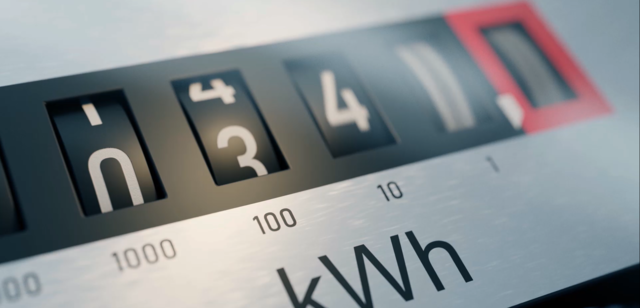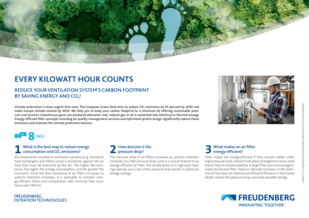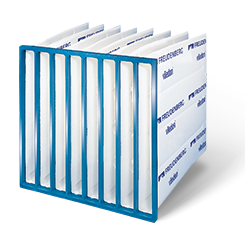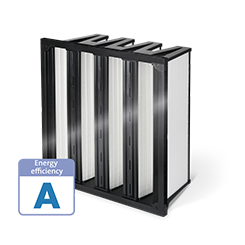Every kilowatt hour counts
Saving energy in industry – thanks to Viledon
Rising energy prices and European climate protection targets pose a major challenge for companies. Industry can no longer avoid the topic of sustainability. The combustion of fossil fuels produces greenhouse gases that accelerate climate change, so conscientious use of resources is essential. Saving energy in industry is not only beneficial for the climate; it also reduces operating costs. Prices for electricity and fossil fuels (gas and oil) are rising rapidly and show no signs of stopping. Intelligent filter concepts reduce CO2 emissions, improve the climate protection balance and lower industrial energy costs.
Reducing energy costs for companies with a suitable air filter concept
If you want to reduce your company’s energy costs, you need to look at the operation of your fans and HVAC systems, as they can account for as much as 20 percent of industrial energy consumption. This huge potential for energy savings is often overlooked. Old fans in particular lead to increased energy costs. The use of controlled fans and Viledon air filters ensures optimum energy-efficient operation of ventilation systems. The benefits of this for industry are twofold: it reduces both energy consumption and CO2 emissions.
Our support for you: an energy-efficient filter concept and service to reduce your systems’ energy costs by up to 30 percent!
Reduce your energy costs by up to 30 percent!
Download more information to learn more.
Energetic system inspection with the Viledon filterCair Service
Our proprietary Viledon filterCair air quality management service can make a significant contribution to reducing energy consumption. Freudenberg’s service technicians have been trained to effect these savings. They carry out energy performance inspections for systems and buildings in accordance with the German Building Energy Act (GEG) and issue the appropriate energy certificate to operators for documentation purposes. Almost any ventilation system can be optimized in this way.
How can we assist you in improving your footprint? Let's talk!
Energy consumption of air conditioning and ventilation systems
If you want to reduce energy costs in industry, you need to look at the energy consumption of HVAC systems. Ventilation system energy consumption in offices accounts for 40 percent of the total energy consumption for the building. In cleanrooms this figure can be as high as 80 percent. Pressure drop is responsible for a large proportion of HVAC systems’ energy consumption. Air filters can account for up to 50 percent of the total pressure drop in ventilation systems.
The fan propels air through the air filter and into the building interior, and so is a significant source of energy consumption. When an ventilation system is in operation, the fan consumes electrical energy. One of the reasons it does this is to overcome filter resistance. In the case of controlled fans, the increasing pressure drop of the air filter causes energy consumption to increase continuously. Filters made by some companies perform poorly in terms of resistance, which results in high energy consumption. A sustainable solution is to reduce pressure drop in air filtration systems. This saves valuable energy, avoids unnecessary costs and reduces CO2 emissions.
Energy-efficient air filters from Viledon
In order to guarantee both optimum energy-efficient operation of HVAC systems and the necessary filter efficiency for good indoor air quality we recommend Viledon air filters with Energy Efficiency Class A+, A or B certification. Their high dust-loading capacity and low pressure drop makes it possible to realize energy savings in industry.
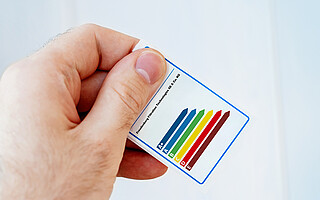
Discover our energy-efficient filtration solutions!
Click on details for more information. Technical data and specific product features can be found in the e-catalog.
Robust in sustained use, high operational dependability and reliability even in the face of extreme moisture and wet conditions. They enable the energy-efficient operation of air conditioning systems. This translates to energy cost savings and a reduction in CO2 emissions.
Energy efficient, combined with high dust holding capacity for energetic optimal operation of ventilation systems. All MVP EE filters achieve energy efficiency class A. Up to 25 % savings in electricity costs and CO2 emissions.









